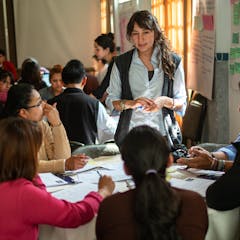
Articles on Academic research
Displaying 1 - 20 of 37 articles

Paper mills rely on the desperation of researchers to fuel their business model.

To inform university responses to online harassment affecting graduate students, artist-researchers created original artworks in response to interviews with their peers who experienced online hate.

In some cases, it can be difficult for academics to know which journals are not credible – but other times, people feel pressure to publish in these publications.

A veteran education researcher raises questions about whether educational research is actually being put to use.

The rise of AI chatbots provides an opportunity to expand the ways we do philosophy and research, and how we engage in intellectual discourse.

Harmful research practices have done serious damage to Indigenous communities and created distrust. The Collaborative Indigenous Research Digital Garden is one way to repair that damage.

When COVID forced exams online, reports of cheating were rife and proctoring software was problematic. But in-person exams are also flawed, so now’s the time to rethink how assessment works.

When working from home, women struggled more than men to find time for the sustained effort needed to produce good, publishable research. Lack of thinking time is a problem for all knowledge workers.

Australia has world-class research but low rates of research commercialisation by global standards. The scale and cultural focus of the government’s plan mean it could have an impact on this problem.

In most countries, ignorance about how to use evidence properly to inform decision-making has led to missteps during the COVID-19 pandemic. Here’s how to do better.

Government vetos of academic research reveal a worrying ignorance of the value of literature to Australia’s society, culture and economy.

Expectations that academics raise funds themselves and aim to publish in certain ‘quality’ publications are shaping research and where it is published.

Pandemic restrictions have shuttered research projects - some, for good. The consequences for science, not to mention policy and decision making, must be addressed

Can college professors rap their way into academic publishing? One professor makes an album to prove they can.

To continue the fast-paced collaborative research and innovation we have seen during the pandemic, here are five ways universities can support health research that responds to societal needs.

If we care that MPs treat all their constituents fairly, we should support work that tests them on their biases – even the implicit ones.

Reading a scientific paper isn’t such a daunting task when you break it down into manageable steps.

The limitations of traditional literature review approaches could be improved relatively easily with a few key procedures.

Journal comments are responses to previously published articles. The gender disparity in the authorship of these comments both reflects and contributes to women’s opportunities in scientific research.

As schools and daycares are closed because of the coronavirus pandemic, academic mothers are finding themselves less able to conduct research and write articles.
